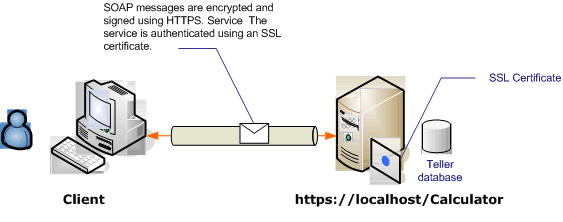Segurança de transporte com um cliente anônimo
Esse cenário do WCF (Windows Communication Foundation) usa HTTPS (segurança de transporte) para garantir a confidencialidade e a integridade. O servidor deve ser autenticado com um certificado do protocolo SSL e os clientes devem confiar no certificado do servidor. O cliente não é autenticado por nenhum mecanismo e, portanto, é anônimo.
Para ver um aplicativo de exemplo, consulte Segurança de Transporte do WS. Para obter mais informações sobre como usar a segurança do transporte, consulte Visão geral da segurança do transporte.
Para obter mais informações sobre como usar um certificado com um serviço, consulte Trabalhando com certificados e Como configurar uma porta com um certificado SSL.

| Característica | Descrição |
|---|---|
| Modo de segurança | Transport |
| Interoperabilidade | Com serviços Web e clientes existentes |
| Autenticação (servidor) Autenticação (cliente) |
Sim Nível do aplicativo (sem suporte para WCF) |
| Integridade | Sim |
| Confidencialidade | Yes |
| Transport | HTTPS |
| Associação | WSHttpBinding |
Serviço
O código e a configuração a seguir devem ser executados independentemente. Realize um dos seguintes procedimentos:
Crie um serviço autônomo usando o código sem configuração.
Crie um serviço usando a configuração fornecida, mas não defina nenhum ponto de extremidade.
Código
O seguinte código mostra como criar um ponto de extremidade usando a segurança do transporte:
// Create the binding.
WSHttpBinding binding = new WSHttpBinding();
binding.Security.Mode = SecurityMode.Transport;
binding.Security.Transport.ClientCredentialType =
HttpClientCredentialType.None;
// Create the URI for the endpoint.
Uri httpUri = new Uri("https://localhost/Calculator");
// Create the service host and add an endpoint.
ServiceHost myServiceHost =
new ServiceHost(typeof(ServiceModel.Calculator), httpUri);
myServiceHost.AddServiceEndpoint(
typeof(ServiceModel.ICalculator), binding, "");
// Open the service host.
myServiceHost.Open();
Console.WriteLine("Press Enter to exit....");
Console.ReadLine();
// Close the service.
myServiceHost.Close();
' Create the binding.
Dim binding As New WSHttpBinding()
binding.Security.Mode = SecurityMode.Transport
binding.Security.Transport.ClientCredentialType = HttpClientCredentialType.None
' Create the URI for the endpoint.
Dim httpUri As New Uri("https://localhost/Calculator")
' Create the service host and add an endpoint.
Dim myServiceHost As New ServiceHost(GetType(ServiceModel.Calculator), httpUri)
myServiceHost.AddServiceEndpoint(GetType(ServiceModel.ICalculator), binding, "")
' Open the service host.
myServiceHost.Open()
Console.WriteLine("Press Enter to exit....")
Console.ReadLine()
' Close the service.
myServiceHost.Close()
Configuração
O código a seguir configura o mesmo ponto de extremidade usando a configuração. O cliente não é autenticado por nenhum mecanismo e, portanto, é anônimo.
<?xml version="1.0" encoding="utf-8"?>
<configuration>
<system.serviceModel>
<services>
<service name="ServiceModel.Calculator">
<endpoint address="https://localhost/Calculator"
binding="wsHttpBinding"
bindingConfiguration="WSHttpBinding_ICalculator"
name="SecuredByTransportEndpoint"
contract="ServiceModel.ICalculator" />
</service>
</services>
<bindings>
<wsHttpBinding>
<binding name="WSHttpBinding_ICalculator">
<security mode="Transport">
<transport clientCredentialType="None" />
</security>
</binding>
</wsHttpBinding>
</bindings>
<client />
</system.serviceModel>
</configuration>
Cliente
O código e a configuração a seguir devem ser executados independentemente. Realize um dos seguintes procedimentos:
Crie um cliente autônomo usando o código (e o código do cliente).
Crie um cliente que não defina nenhum endereço de ponto de extremidade. Em vez disso, use o construtor do cliente que usa o nome da configuração como um argumento. Por exemplo:
CalculatorClient cc = new CalculatorClient("EndpointConfigurationName");Dim cc As New CalculatorClient("EndpointConfigurationName")
Código
// Create the binding.
WSHttpBinding myBinding = new WSHttpBinding();
myBinding.Security.Mode = SecurityMode.Transport;
myBinding.Security.Transport.ClientCredentialType =
HttpClientCredentialType.None;
// Create the endpoint address. Note that the machine name
// must match the subject or DNS field of the X.509 certificate
// used to authenticate the service.
EndpointAddress ea = new
EndpointAddress("https://machineName/Calculator");
// Create the client. The code for the calculator
// client is not shown here. See the sample applications
// for examples of the calculator code.
CalculatorClient cc =
new CalculatorClient(myBinding, ea);
// Begin using the client.
try
{
cc.Open();
Console.WriteLine(cc.Add(100, 1111));
// Close the client.
cc.Close();
}
' Create the binding.
Dim myBinding As New WSHttpBinding()
myBinding.Security.Mode = SecurityMode.Transport
myBinding.Security.Transport.ClientCredentialType = HttpClientCredentialType.None
' Create the endpoint address. Note that the machine name
' must match the subject or DNS field of the X.509 certificate
' used to authenticate the service.
Dim ea As New EndpointAddress("https://machineName/Calculator")
' Create the client. The code for the calculator
' client is not shown here. See the sample applications
' for examples of the calculator code.
Dim cc As New CalculatorClient(myBinding, ea)
' Begin using the client.
Try
cc.Open()
Console.WriteLine(cc.Add(100, 11))
Console.ReadLine()
' Close the client.
cc.Close()
Catch tex As TimeoutException
Console.WriteLine(tex.Message)
cc.Abort()
Catch cex As CommunicationException
Console.WriteLine(cex.Message)
cc.Abort()
Finally
Console.WriteLine("Closed the client")
Console.ReadLine()
End Try
Configuração
A configuração a seguir pode ser usada em vez do código para configurar o serviço.
<configuration>
<system.serviceModel>
<bindings>
<wsHttpBinding>
<binding name="WSHttpBinding_ICalculator" >
<security mode="Transport">
<transport clientCredentialType="None" />
</security>
</binding>
</wsHttpBinding>
</bindings>
<client>
<endpoint address="https://machineName/Calculator"
binding="wsHttpBinding"
bindingConfiguration="WSHttpBinding_ICalculator"
contract="ICalculator"
name="WSHttpBinding_ICalculator" />
</client>
</system.serviceModel>
</configuration>